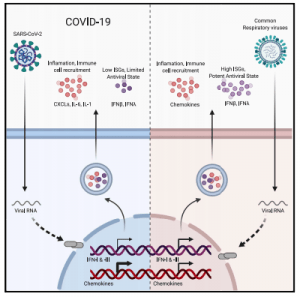A recent study in Cell focused on defining the host response to SARS-CoV-2 and other human respiratory viruses in cell lines, primary cell cultures, ferrets, and COVID-19 patients. The authors show a distinct transcriptional footprint exists with SARS-CoV-2 infection when compared with other coronaviruses and common respiratory viruses such as IAV, HPIV3, and RSV. The response to SARS-CoV-2 was defined by low levels of type I and III interferons and elevated chemokines CCL2, CXCL2, CCL8, CXCL8, CXCL9, CXCL16 and high expression of IL-6. The authors propose that “reduced innate antiviral defences coupled with exuberant inflammatory cytokine production are the defining and driving features of COVID-19”. Treatment modalities would therefore need to disrupt chemokine signalling along with IL-6 driven inflammation.
Journal Article: Blanco-Melo et al., 2020. Imbalanced Host Response to SARS-CoV-2 Drives Development of COVID-19. Cell











